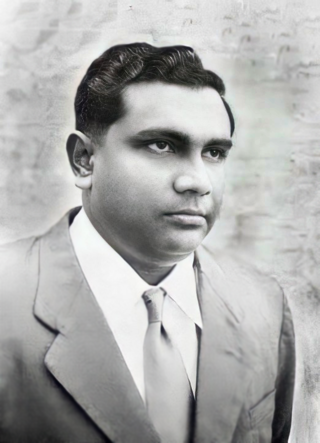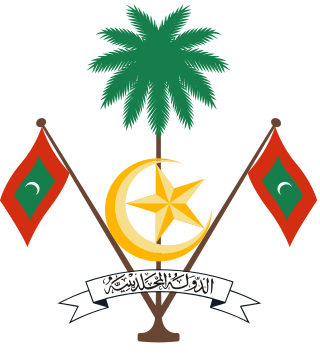| This article is part of a series on the |
| Politics of the Maldives |
|---|
 |
A constitutional referendum was held in the Maldives on 17 and 18 April 1952. The new constitution would convert the country from a monarchy to a republic.
| This article is part of a series on the |
| Politics of the Maldives |
|---|
 |
A constitutional referendum was held in the Maldives on 17 and 18 April 1952. The new constitution would convert the country from a monarchy to a republic.
After the death of Sultan Abdul Majeed Didi on 21 February 1952, the members of the country's parliament chose Mohamed Amin Didi to be the next Sultan. However, he stated that "for the sake of the people of Maldives I would not accept the crown and the throne". [1]
The People's Majlis voted on 13 April to form a commission with Amin Didi as its chairman to determine the country's future governance structure. Other members included Famuladeyri Kaleygefan, Chief Justice Abdullah Jalaludeen, Majlis Speaker Malim Moosa Mafaiy Kilegefan, Deputy Vazirul-Auzam Ibrahim Mohamed Didi, Kolhumadulu Atoll MP Ibrahim Shihab, Galolhu MP Bucha Hassan Kaleygefan and Faadhippolhu Atoll chief Kaannaa Kaleygefan. [2] On 16 April, the People's Majlis affirmed the commission's decision to form a republic, and to hold a referendum on a new constitution over the following two days. However, the referendum would only be held in Malé. [2]
The results of the referendum were announced at 16:00 on 18 April. [2] A large majority had voted in favour, and the new constitution came into force on 1 January 1953. Didi became the country's first President after winning almost 96% of the vote in an election. [3] However, he was overthrown on 21 August that year. Following a referendum in the same month, the country reverted to monarchy status on 7 March 1954, [4] with Muhammad Fareed Didi as sultan.
In 1968 a third referendum on the issue was held, resulting in the country becoming a republic for the second time.

The history of the Maldives is intertwined with the history of the broader Indian subcontinent and the surrounding regions, comprising the areas of South Asia and Indian Ocean; and the modern nation consisting of 26 natural atolls, comprising 1194 islands. Historically, the Maldives held a strategic importance due to its location on the major marine routes of the Indian Ocean. The Maldives' nearest neighbours are the British Indian Ocean Territory, Sri Lanka and India. The United Kingdom, Sri Lanka and some Indian kingdoms have had cultural and economic ties with the Maldives for centuries. In addition to these countries, Maldivians also traded with Aceh and many other kingdoms in, what is today, Indonesia and Malaysia. The Maldives provided the main source of cowrie shells, then used as a currency throughout Asia and parts of the East African coast. Most probably Maldives were influenced by Kalingas of ancient India who were earliest sea traders to Sri Lanka and the Maldives from India and were responsible for the spread of Buddhism. Stashes of Chinese crockery found buried in various locations in the Maldives also show that there was direct or indirect trade contact between China and the Maldives. In 1411 and 1430, the Chinese admiral Zheng He 鄭和 visited the Maldives. The Chinese also became the first country to establish a diplomatic office in the Maldives, when the Chinese nationalist government based in Taipei opened an embassy in Malé in 1966. This office has since been replaced by the embassy of the People's Republic of China.
The politics of the Maldives take place in the framework of a presidential representative democratic republic, whereby the President is the Head of Government. Executive power is exercised by the government. The President heads the executive branch and appoints the Cabinet; like many presidential democracies, each member of the cabinet need to be approved by the Parliament. The President, along with their pick for vice president, is directly elected by the denizens to a five-year term by a secret ballot. Once in office, they could be re-elected to a second 5-year term, which is the limit allowed by the Constitution. The current President of the Maldives is Mohamed Muizzu, when his predecessor, Ibrahim Mohamed Solih lost the 2023 Maldivian presidential election.

Maumoon Abdul Gayoom is a Maldivian politician who served as President of the Maldives from 1978 to 2008. After serving as transport minister, he was nominated president by the People's Majlis and succeeded Ibrahim Nasir in 1978. He was defeated in 2008 during the first Presidential Elections after democratic reforms in the Maldives. He holds the nations highest award, "The Most Honourable Order of Distinguished Rule of Ghaazee", presented to him in 2013. Maumoon was the longest-serving president in Asia.

Al Ameer Ibrahim Nasir Rannabandeyri Kilegefan, KCMG, NGIV commonly known as Ibrahim Nasir, was a Maldivian politician adhering to the non-aligned ideology and staunch anti-imperialist. Nasir served as the Prime Minister of the Maldives from 1957 to 1968 under the monarchy, and later the first President of the Second Republic of Maldives from 1968 to 1978. Nasir served two terms, then he decided to retire, even though the People's Majlis voted him in for a third term. Nasir is remembered as an independence hero for guiding the Maldives to independence from the British Empire, he is also credited for establishing the tourism industry in the Maldives, as well as rapidly modernizing and developing the country and economy.

The Maldivian Democratic Party is the first political party formed in the Republic of Maldives with a total membership of 52,142 individuals as of 5 March 2024.

Sumuvvul Ameer Mohamed Amin Dhoshimeynaa Kilegefaanu, popularly known as Mohamed Amin Didi, was a Maldivian politician. He served as the first president of the Maldives and as the head of government between January 1, 1953, and August 21, 1953. Amin Didi was also the principal of Majeedhiyya School from 1946 to 1953.

King Muhammad Fareed Didi, , the son of the Sultan Prince Abdul Majeed Didi, was the last Sultan of Maldives and the first Maldivian monarch to assume the title of "King" with the style of "His Majesty". He was the Sultan of the Maldives from March 7, 1954, until July 26, 1965, and King of the Maldives from July 26, 1965, until November 11, 1968. He was deposed in 1968 from the throne when Maldives became a republic, and died the following year in Maldives.
The Constitution of the Maldives is the supreme law of the country of Maldives. It provides the legal foundation for the existence of the Republic of Maldives, sets out the rights and duties of the citizens of the Maldives, and defines the structure of the Government of the Maldives. The current Constitution of the Maldives was ratified by the then president, Maumoon Abdul Gayyoom, on 7 August 2008, and came into effect immediately, replacing and repealing the Constitution of 1998.

The President of the Republic of Maldives is the head of state and head of government of the Republic of Maldives and the commander-in-chief of the Maldives National Defence Force.

The United Suvadive Republic was a short-lived breakaway state from the Sultanate of Maldives between 1958 and 1963, consisting of the three southern atolls of the Maldive archipelago: Addu Atoll, Huvadhu Atoll and Fuvahmulah. The first president of the new nation was Abdulla Afeef Didi. The secession occurred in the context of the struggle of the Maldives’ emergence as a modern nation. The United Suvadive Republic inherited a Westminster system of governance cloned from Britain along with other institutional structures.

Abbas Ibrahim is a Maldivian politician. He is the brother-in-law of former President Maumoon Abdul Gayoom. Ibrahim is a former speaker of the Special Constitutional Majlis (parliament) of the Maldives from its convocation in 2004 to 2006. He has served as an MP since 1981, and as of 2008 was the MP for Gaafu Dhaalu Atoll.
Dhadimagu is an administrative division of Fuvahmulah, Maldives. It is the largest division of the island, located in the northern part of the island. Throughout history, many scholars and famous public figures came into being from this district housing many of the historical sites and landmarks of the island. A center of learning as well as an important location for the island's economy, the number of 'Hafiz's and teachers from this district outnumber that of any other district in Fuvahmulah, and this district is considered by many to be the most educated and learning-centered district of Fuvahmulah.

The vice president of the Republic of Maldives is the second-highest official in the executive branch of the government of the Maldives, after the president of the Maldives, and ranks first in the presidential line of succession. The vice president is directly elected together with the president to a five-year term of office.

Muliaage, also transliterated as Mulee Aage, Mulee-age, Mulee'aage, or Muleeaage, is the official residence of the President of the Maldives. The Muliaage is located in the ward of Henveiru in the historic center of Malé. It is in close proximity of the Medhu Ziyaaraiy, the Friday Mosque, and the Munnaru.
Maadhadu is an administrative division of Fuvahmulah, Maldives. With the changes it has encountered over time, this is today the smallest district in Fuvahmulah. Located in the center of the island the district shares borders with Diguvāndo, Hōdhado, Mālegan and Miskimmago.
Presidential elections were held for the first time in the Maldives in 1952. They followed the approval of a new constitution in a referendum in March 1952, which had changed the country's system of governance from being a monarchy to a republic.

Ibrahim Mohamed Solih, commonly known as Ibu, is a Maldivian politician who served as president of the Maldives from 2018 to 2023.
Parliamentary elections were held in the Maldives in September 1969, the first under the 1968 constitution. The newly elected People's Majlis convened in February 1970.

The Sultanate of Maldive Islands was an Islamic monarchy that controlled the Maldives for 815 years (1153–1968), with interruption.